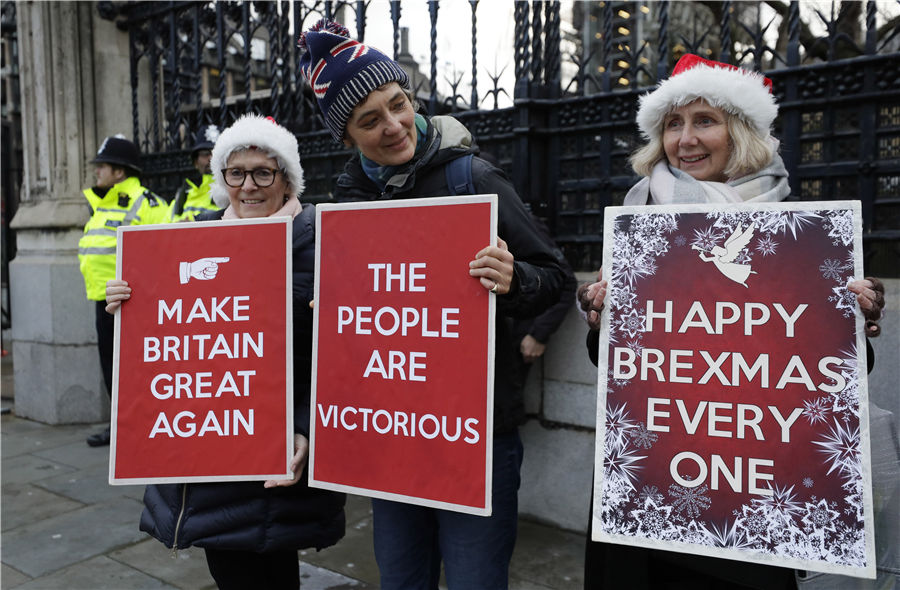
Pro-Brexit demonstrators hold banners outside Parliament in London on Dec 20. In the recent general election, Prime Minister Boris Johnson's message to "Get Brexit Done" had resonated with the public who had grown tired of a lack of resolution on the subject. (Photo: Agencies)
Brexit path becomes clear but Tories' poll win can't mask society's divisions
Following a general election, British politics looks very different at the end of 2019 compared with the beginning of the year.
Over the course of 12 months, Britain's Parliament reversed its position on the government's proposed withdrawal agreement bill on the nation's exit from the European Union, finally passing it three-and-a-half years after the country voted in a referendum to leave.
The original Brexit deal deadline of March 29, 2019, was set for two years after then prime minister Theresa May triggered Article 50-the formal process to leave-and kicked off negotiations.
May's minority government stumbled its way through attempts to pass laws and tackle Brexit, and ultimately brought gridlock to the House of Commons.
Under May, the deadline was delayed twice after members of Parliament rejected her negotiated Brexit deal-eventually pushing it to Oct 31.
The main sticking point for many MPs of the ruling Conservative Party was the so-called Irish backstop, designed to ensure there would be no border posts or barriers between Northern Ireland and the Republic of Ireland after Brexit.
After winning a Conservative leadership contest in July, Prime Minister Boris Johnson took over and set about renegotiating May's deal.
Johnson succeeded in replacing the backstop with new customs arrangements, and unlike the previous deal, the revised one would allow the United Kingdom to sign and implement its own trade agreements with countries around the world.
Despite this, Johnson missed the latest deadline after MPs again failed to pass the revised deal into law. The failure to approve a deal meant that Johnson had to send a letter to the EU to ask for a third Brexit delay. The EU agreed to a further extension, resulting in the deadline being pushed to Jan 31, 2020.
With Parliament in deadlock over the deal, Johnson called for an early general election, to which MPs agreed. The election, on Dec 12, resulted in a Conservative majority of 80, meaning it was then relatively straightforward for Johnson to pass his Brexit deal.
On Dec 20, in a historic moment for the nation, the withdrawal agreement bill was finally passed by 358 votes to 234.
In the election, the Conservatives celebrated their largest majority since Margaret Thatcher's landslide win in 1987, while Labour faced up to its worst election result since 1935.
The decisive majority was won with a big swing of votes from Labour to the Conservatives in areas of Britain that voted to leave the EU in 2016.
Johnson's message to "Get Brexit done" resonated with a public that had become weary of the lack of resolution over the subject.
The Labour strategy of trying to retain its support by remaining ambiguous about whether it was a pro-Remain or a pro-Leave EU party backfired badly.
Labour leaders Jeremy Corbyn and John McDonnell apologized over the party's "catastrophic" defeat, which saw it lose 59 seats. The leader and shadow chancellor said they would step down in the new year.
Corbyn conceded that MPs "have to respect the decision of the EU referendum in 2016, and move on", but added: "That doesn't mean that we as a party should abandon our principles."
He said: "We remain certain there is a better and fairer way for this country to leave the EU. One which would not risk ripping our communities apart, selling out our public services or sacrificing hundreds of thousands of jobs in the process."
When MPs return after their Christmas recess on Jan 6, the Brexit bill will be debated for a further three days. It is expected to pass to the upper house of the UK Parliament, known as the House of Lords, by Jan 9. Once approved there, as is likely, the UK will be formally set to leave the bloc on Jan 31.
But this is only the first stage in the country's departure arrangements with the EU, as the UK will next enter a transition period until Dec 31, 2020.
Free-trade deal
During this period, the UK's trading relationship with the EU will remain the same while the two sides negotiate a free-trade deal.
If a trade deal is ready in time, the UK's new relationship with the EU can begin immediately after the transition. If not, the UK faces the prospect of having to trade with no agreement in force. This would mean possible checks and tariffs on UK goods traveling to the EU.
The Scottish National Party, which won 48 of Scotland's 59 seats in the election, says it rejects Brexit and now seeks to hold a second independence referendum-a ballot to which the Conservatives are strongly opposed. A constitutional clash between the Scottish and UK governments seems inevitable.
Though the process of ratifying the revised withdrawal agreement bill will continue in the new year, the country is now motoring toward the Jan 31 departure date. Johnson says "now is the time to act and forge a new relationship" with the rest of Europe.
Despite the progress, the UK remains a country divided by Brexit. More than half the votes cast in the election were in favor of parties that were more inclined to remain in the European Union. As the prime minister says, there is now "certainty". But also, certainly, there is less unity.


